 Petzlover
Petzlover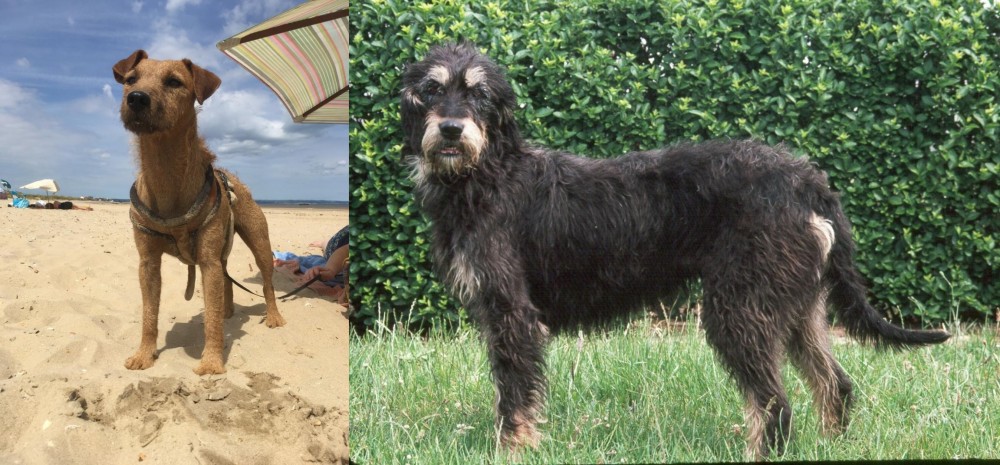 Fell Terrier is originated from United Kingdom but Griffon Nivernais is originated from France. Fell Terrier may grow 24 cm / 9 inches shorter than Griffon Nivernais. Fell Terrier may weigh 16 kg / 35 pounds lesser than Griffon Nivernais. Both Fell Terrier and Griffon Nivernais has same life span. Both Fell Terrier and Griffon Nivernais has same litter size. Both Fell Terrier and Griffon Nivernais requires Moderate Maintenance.
Fell Terrier is originated from United Kingdom but Griffon Nivernais is originated from France. Fell Terrier may grow 24 cm / 9 inches shorter than Griffon Nivernais. Fell Terrier may weigh 16 kg / 35 pounds lesser than Griffon Nivernais. Both Fell Terrier and Griffon Nivernais has same life span. Both Fell Terrier and Griffon Nivernais has same litter size. Both Fell Terrier and Griffon Nivernais requires Moderate Maintenance.
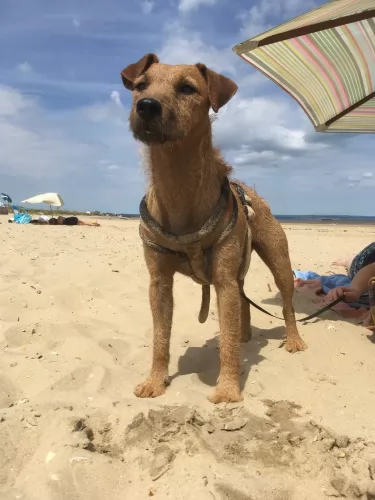 Fell terriers, known by other names such as Lakeland-, Patterdale-, Red Fell or Black Fell Terrier are small working terriers, hailing from the fell or hilly country of northern England.
Fell terriers, known by other names such as Lakeland-, Patterdale-, Red Fell or Black Fell Terrier are small working terriers, hailing from the fell or hilly country of northern England.
Several breeds have been developed from the Fell terrier, of which the Patterdale Terrier, Lakeland are some as well as other locally developed breeds. All these particular breeds are sometimes referred to as the Fell Terrier, and in fact the National Terriers Club LLC has published a Fell Terrier standard.
It is also believed that the long legged Fell Terriers may have descended from an old type of terrier referred to as the rough-coated Black and Tan. The Black and Tan Terrier is now extinct but was drawn into The Kennel Club as the Welsh Terrier.
 The Griffon Nivernais is a working breed dog originating in France and used as a hunting dog because of his exceptional scent skills and his alertness with hunting.
The Griffon Nivernais is a working breed dog originating in France and used as a hunting dog because of his exceptional scent skills and his alertness with hunting.
The idea was to develop a dog that looked much like the hunting dogs of the Middle Ages. French noblemen kept these dogs but the breed disappeared somewhat after the French Revolution, being restored again in 1925.
The restoration of the breed was done based on the Grand Griffon Vendeen but other breeds were also used such as the Otter- and Foxhounds. The breed has yet to receive official recognition by the AKC but it is recognized by both the FCI and the UKC.
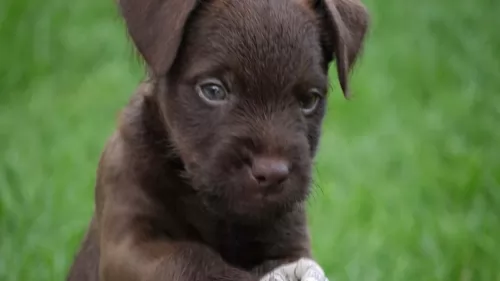 Small and feisty, the Fell Terrier is a working dog used for hunting purposes. He stands at roughly 31cm to 38cm in height and ways between 6 to 9kg.
Small and feisty, the Fell Terrier is a working dog used for hunting purposes. He stands at roughly 31cm to 38cm in height and ways between 6 to 9kg.
The dogs were sought after for their hunting skills as being the small dog they were, and with their narrow chests, they were able to move around in small, narrow underground tunnels.
The Fell has long legs, and his coat is shortish but with a rough texture to it. The coat is found in different colors such as white, black and tan, chocolate, red, black and bronze. The ears are medium length and floppy while the tail of the dog is traditionally docked, but these days the tail is often left long, and then he becomes less distinctive.
Used to having hunted in packs, the Fell Terrier has always been used to getting along well with other dogs. He makes a fantastic family pet and will get on well with children who have been been taught to respect animals. He is an independent, strong-willed dog and will certainly need socialization and training to turn him into an obedient dog.
He is energetic, fearless, strong-willed, determined and always ready for a game or some form of action.
 As a medium sized dog, the Griffon Nivernais stands at 55 to 62cm in height and weighs between about 22 and 25kg.
As a medium sized dog, the Griffon Nivernais stands at 55 to 62cm in height and weighs between about 22 and 25kg.
He is recognized easily by his distinctive rough or shaggy coat which is a grey with fawn around the muzzle and legs. Other colors can be black and fawn. Sometimes this blend of colors gives him a grizzled look in appearance.
He is also noted for the hairy eyebrows, a beard and mustache. He has dark brown eyes, black nose, long floppy ears and a tail that is held upright and with a slight curve. He is a muscular dog with a deep chest and a slight arch in the back.
Stubborn, courageous and independent, the Griffon Nivernais is a hunting dog with amazing scenting abilities. He is a dog used to working in a pack with other dogs so he tolerates other dogs well. He is a friendly dog, getting on well with children as well.
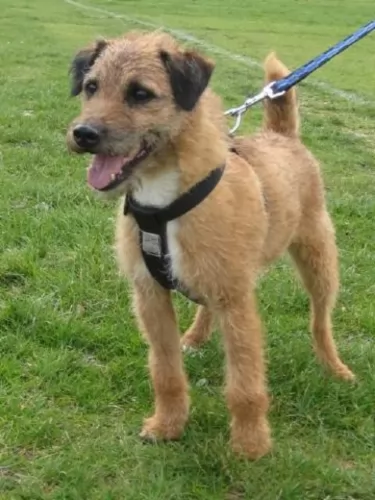 The Fell Terrier still has dreams of the hunt in him and with his strong prey instincts, he isn’t really suited to city living, but will fit ideally into life in the country.
The Fell Terrier still has dreams of the hunt in him and with his strong prey instincts, he isn’t really suited to city living, but will fit ideally into life in the country.
He is a high spirited, working dog with an endless amount of energy. He bonds closely with his human family, and for all his robust, larger-than-life attitude and boldness, when he is with his human family he can be gentle, calm and loving, just thriving on the love he receives.
Your Fell Terrier is just waiting to be your best friend and a never ending source of unconditional love.
 Your Griffon Nivernais is a sociable, stubborn, independent dog who loves to be around his human family members.
Your Griffon Nivernais is a sociable, stubborn, independent dog who loves to be around his human family members.
Socialization and training will do him good and round him off, making him obedient and responsive to your commands. He isn't an aggressive dog, but is even tempered and confident.
Exercise him well, feed him quality food, give him a nice warm, dry place to sleep, just like any other family member of yours, and you'll be rewarded with the companionship of a faithful, loving friend.
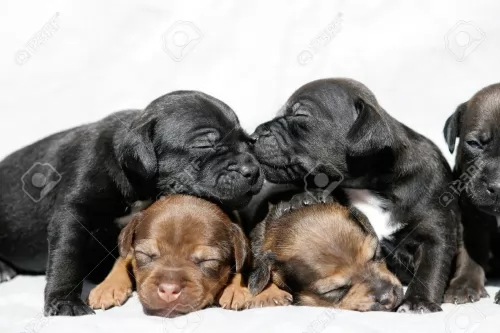 Caring for your Fell Terrier requires knowing what do do with him when he develops certain common dog illnesses. He is a robust dog and is not likely to get any serious illnesses, but still you want to know about some of the more common ones.
Caring for your Fell Terrier requires knowing what do do with him when he develops certain common dog illnesses. He is a robust dog and is not likely to get any serious illnesses, but still you want to know about some of the more common ones.
If you suspect an illness, get your pet to the vet who can provide you with a treatment plan for your dog.
Your Fell Terrier can easily fall prey to dental disease if you don't brush his teeth at least 2 or 3 times a week. Unfortunately bad teeth isn't just a case of losing a tooth or two, bad teeth can cause serious diseases such as kidney disease. Tarter build-up progresses to infection of the gums as well as roots of the teeth. So serious is dental disease that your dog can actually have his life shortened.
Your Fell Terrier is a small dog and obesity can easily creep up if you don't control your pet's diet. Obesity is a serious illness that can increase problems with the joints and digestion.
 The typical lifespan for your Griffon Nivernais is 10 to 14 years. Even though you're highly unlikely to spend much time with him at the vet, there are one or two common dog illnesses worth knowing about -
The typical lifespan for your Griffon Nivernais is 10 to 14 years. Even though you're highly unlikely to spend much time with him at the vet, there are one or two common dog illnesses worth knowing about -
It is the fate of many dogs with floppy ears that they are prone to developing ear infections. You may notice him shaking his head canine, his ears may be red and there could even be a discharge.Get him to the vet as ear infections can be promptly treated with a course of medication.
Remember to have your Griffon Nivernais puppy vaccinated at 6 weeks of age. Puppies are vulnerable to horrible diseases which can sap the very life from them. These diseases are distemper, canine hepatitis, parvovirus as well as rabies. The puppy’s first vaccinations should be at 6 weeks of age followed by a second vaccination 2 to 4 weeks later.
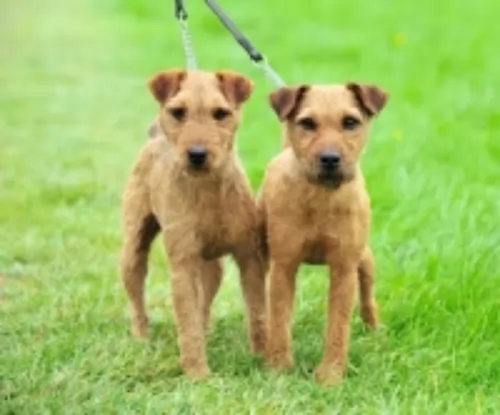 Your Fell Terrier is an active dog who won’t thrive if he is cooped up and ignored. He thrives on action and will need to be taken on walks with you and involved in all your games and sports, such as when you go jogging, swimming or cycling.
Your Fell Terrier is an active dog who won’t thrive if he is cooped up and ignored. He thrives on action and will need to be taken on walks with you and involved in all your games and sports, such as when you go jogging, swimming or cycling.
Feed your Fell Terrier the best quality commercially manufactured foods if you opt to feed your pet this way. Include cooked brown rice, vegetables and chicken into his kibble from time to time and always ensure there is cool, fresh drinking water available to him.
It depends on whether your Fell Terrier has a short, smooth coat, or the longer-haired coarse coat. He will certainly need brushing twice a week and sometimes, with the longer coats, he may require professional trimming or stripping.
Always check nails, in and outside the ears and remember to brush his teeth with canine toothpaste and toothbrush twice a week at least.
 This breed needs to be walked daily, and he needs a large space to run and play. Take him on walks, to the park, or give him a good game with ropes and balls.
This breed needs to be walked daily, and he needs a large space to run and play. Take him on walks, to the park, or give him a good game with ropes and balls.
In spite of his long, shaggy coat, the Griffon Nevernais doesn't need any special grooming and his shaggy coat will require brushing twice a week to remove loose hairs. When you brush him, you can also check for fleas and ticks.You get special flea combs for this. You can speak to your vet about recommendations too.
Because his coat is of a harsh texture it doesn't tangle or matt. Bathing will only be necessary when he becomes super dirty as too much bathing removes natural oils. He will need to have his nails trimmed if they don't wear down naturally, and he will also need to have his ears cleaned to keep them free of wax and dirt and to prevent ear infections.
Brush his teeth 2 or 3 times a week will also help towards preventing dental disease.
He is a high energy dog so he will need to get top quality food. You can feed him the best commercially manufactured food but its to his advantage to include some home-made food too such as cooked chicken, brown rice and vegetables. He'll also need some raw meat from time to time and a constant supply of fresh, cool water.